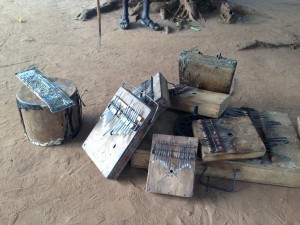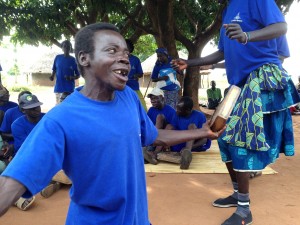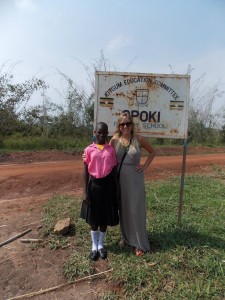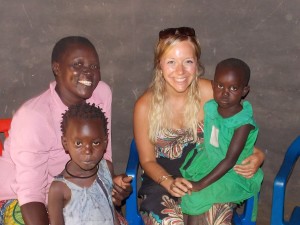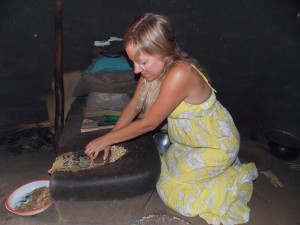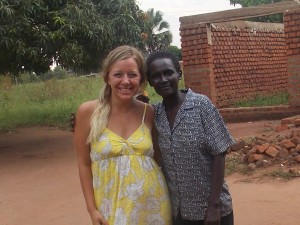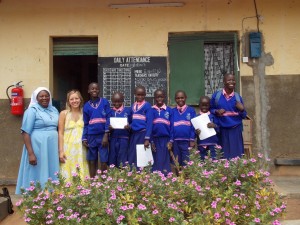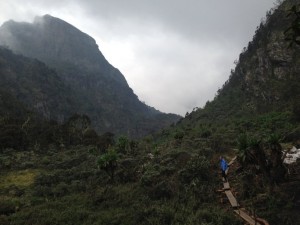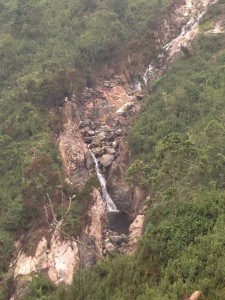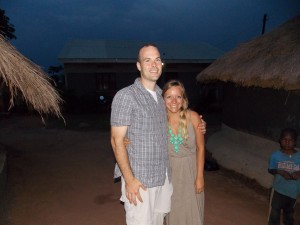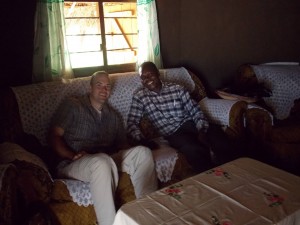Hi everyone – I am FINALLY getting around to posting some of the videos of Can Oniang (not just audio). Â I am having trouble with the larger ones, but here are a few to start with…
|
|
|
|
Hi Everyone! Â I am late in doing this, but I’d like to post the fantastic music of Can Oniang on this site. Â When we were in Lokung in July, we recorded a dozen songs….take a listen. Â There is nothing in the world quite like it. Â There are several varieties of just 3 instruments, all handmade from nothing but tossed away metal and wood. Â The main instrument is a thumb piano, there is a drum or two, and the other a shaker rattle. Â Thank you to everyone in the group for making that a great day! Â I will post some videos later. Â Please comment if you like the music! Can Oniang – Gwoke Ki Two Jonyo (Take Care of AIDS) Can Oniang – Wan Lotino Acel (We Are One People) Can Oniang – Wapwoyo America (Thank You America) Can Oniang – Rwot Rubanga Mucweyo Wa (God Created Us) Can Oniang – Oketo Gingi Ikom Mon (Stop Domestic Violence) Can Oniang – Bolicub (Cashbox) Can Oniang – Lok Pangom Oketo Wat (Land Conflicts) Can Oniang – Odyena (My Friend) Yesterday, I wrapped everything up in Uganda as neatly as possible, but I still fear (or shall I say know?) that the work isn’t “done”; over the last week, I ran full speed, writing documents that needed to be created, arranging conversations that needed to be had, and meeting people that I still needed to greet so quickly that I really haven’t had time to reflect on what this trip has been all about. Â And maybe, like so many of my experiences, I won’t know for a long time. Â I do know that I am exhausted but brimming with vivid, colorful stories that need to be told while still fresh in my mind. Â As I sit in the Amsterdam airport, where it is more clear that Starbucks connects us as human beings than the raw and cumbersome emotions I felt in Uganda, I see that now is the time to try, my six hour window of opportunity to capture what I can.
I started the week in Madi Kiloch to meet yet another sponsored student. This school, Opoki, was another disappointment: with seven classes, only two teachers showed up for work, the students asked to follow the head prefect (Harry Potter meets Africa :)) in song and exercises during the day in lieu of the teacher’s presence. Â Seriously. Â The picture is starting to become more clear in my mind: why should I pay school fees to send my kid to a school where the teachers aren’t qualified and rarely show up, when he/she could be helping me in the field so that we are “guaranteed” (if the drought holds off, if the sun shines enough, if the bugs don’t take over…) some little money and food. Â Now, shame on me for hating on the teachers: they haven’t been paid in three months; as the U.S. and other donors from abroad have started to pull out support, the government doesn’t know how to support itself. Â The month-long trip, though, has worked me over, tearing away my stories of the romantic life of Ugandans; the pictures, complex and difficult to capture, are clear to me now. Â They’re messy. Â And yet they’re mine.
Upon meeting Nancy Lamara, our female 7th grade sponsorship student, her story helped me to see the immediate  complications that keep so many feeling trapped: while her story is unique, everyone has one with a similar plot.  Tears pooled in her big brown eyes as she told it – her father: abducted during the war, beaten to near death, crawled home just in time to say his final goodbyes, just in time for Nancy to watch him die a brutal and needless death.  Her mother: now broke, decided that leaving was her only option.  Her grandmother: the only one left to provide, but knew she had to struggle to do so even though she ages by the day.  And Nancy: grateful to be sponsored, knowing that she wants more, yet unsure what more even looks like.  (Her gift: she’s bold, spunky, secure, unafraid like so many are; she did not hesitate to say, in front of her Headmaster, the teachers’ lack of dedication to her education is her main struggle right now.).  It’s so obvious to me that, while people know what’s good, know what they are lacking, they just simply can’t get out of the cycle of war, poverty, fear, survival.  I left her with a big hug, a promise of our return, of love and greetings from the Pewaukee students, of hope for something better (at least in the short term: we are getting her out of that god-forsaken school for next year).
The next day I traveled to Paloga, that same place where it all began in 2011. Â As we drove past the place where I met those needy kids who inspired me to invest my life in the universal “them”, I heard a voice reminding me that somewhere, someone has orchestrated this. Â To be here two years later, with the beginning of real education initiatives taking place in a very concrete way, I was reminded that this isn’t the end, just like that day wasn’t. Â I took lunch with the same people, the same little Sophia sitting in my lap, the same women cooking for me, the same men sitting around the hut, the same glue binding us together. Â As the people asked me for more funds, for bigger projects, I “fearlessly” spoke my truth (admittedly, it’s easier to be more bold when you are speaking through a translator :)) — that we can’t think bigger until we get this project right; that we can’t live ahead of our current reality until we learn the lessons that God is demanding of us right now. Â On the way out, there was a new born puppy only one week old finding his feet on the compound. Â I picked him up, embracing him in adoration and the people roared in laughter: while people keep dogs here, they, in no way, view them as we do: they are the garbage disposals, the watchmen, the companions of the goats — but the second they kill and eat a free range chicken on the compound, they’re goners. Â But, I can’t release my cultural adoration for puppies, so I scooped him and I named him, I kissed him on the head, only affirming the alien-like nature of the muzungu. Â On the car ride back, we found a man lying on the road. Â We backed up, pulling to the side, as I feared to look and see if his chest was moving or not. Â The driver confirmed that it was, so we got out of the car to help. Â He was just there, seriously not well, one leg buckled under his fallen body. Â Soon a group of travelers on bicycles, motorbikes, and foot-ers (the women with huge bundles atop their heads) gathered round. Â We shook, we shouted, we slapped and finally, he came out of his stupor. “Why are you bothering me,” he spit, vapors of vodka escaping his mouth. Â Seriously?!? It was around 3:00 p.m. Â Everyone laughed from their bellies as they went back on their way. Â My good friend, Kenneth (the deacon who saved my life in more ways than I can include in this here blog post), noticed how I lacked to see the hilarity of the situation. Once back in the car, he explained that it’s normal: the lost generation of men raised in the camps who only know escape. Â “It’s just a part of life,” he said, a cliche that I’ve come to know well over the last four weeks, something people say about issues like abductions and land mines and poisonings and clan wars and empty arrests: issues that are just so clearly NOT a part of life in the USA.
I was told that, on Wednesday, I would be learning how to cook a meal with Joyce, the wife of my educational partner, Otim John Bosco. Â I had met her the week prior when she took me to her classroom where I witnessed her clear excellence as a teacher. Â In a class of 150(!) students, she was able to grasp the love and attention of each once, explaining why the school she works for (our sponsorship school of choice for next year) is the best in the district. Â The plan was that we would cook dinner, so I was surprised to see her at 10:00 in the morning with her three kids and two orphans in tow. Â The whole family (except Dad) had taken the day off for this event. Â I quickly readied myself: for the first time I walked through the bush to get to her place, winding through nonsensical dirt pathways that were clearly mapped in her mind. Â We arrived to the compound where she explained the purpose of the three huts: two easily converted from living room to bedroom to storage room to dining room, the third, the kitchen. Â She laid out the mat and I took a seat: finally I was a real woman, not sitting on a chair with the men, not drinking beer and bottled water while the women hid in a hut working like bees to cater to us. Â She handed me the greens and the kids and I picked the leaves off the stems while she began the fire. Â Her oven/stove combination was quite remarkable: made of cow dung and dirt, it was attached to the side of the hut with a small hole for the smoke leading to the outside. Â She said that she had made it herself and was quite pleased with her work: many of her friends had hired someone to make theirs only to find it broken in a few months. Â Hers had lasted a year so far. Â Back and forth she went, attending the fire, and then demonstrating how she “cleaned” the greens: slapping the dirt off with her hands while it fell through the woven strainer. Â The once shy kids couldn’t contain their giggles: I couldn’t really “slap” but rather “patted” which defeated the whole purpose of removing the dirt. Â Oh well. Â 🙂 Â We then started cracking open the peanuts, the kids dutifully following their mother’s instructions, cutting veggies (with a knife), teaching each other our various methods, comparing the Ugandan cost to the American. Â Once shelled, I learned how to winnow the peanuts, first checking the direction of the wind, before tossing and blowing away their skins. Â At first, I was horrible and probably lost about half of the nuts to gravity, but I gradually got better. Â Back into the kitchen we went where I learned to toast and grind the nuts into a delicious natural butter that we would mix with the veggies. Â We cut the goat, toasted the rice, boiled the greens. Â The smoke ensconced us unbearably, but I was the happiest I’d been all trip, working on something tangible, able to see some form of a concrete result for the first time in awhile. Â All the while, Joyce and I shared stories of cooking, explaining our methods, exchanging words for “knife” and “pot” in Acholi and English. Â She taught me songs and we sang along with the kids as we completed the work. Â I lost myself in the process and quickly hours passed by.
Once the meal was complete, we retreated to the living room/dining room hut where I tasted the food with a whole new mouth: one filled deep with appreciation for every meal I’d had in this place. Â Peace, the youngest daughter and my favorite of them all, snuggled into my lap and fell asleep as we took tea and exchanged more stories: childbirth (I’ve been sharing the news of my aunt-hood everywhere :)), wife-hood, mother-hood — struggle, joy and pain. Â While this woman was connected to the universal stories of pain (three of her cousins killed her mother out of jealousy for her successful family; he brother died of TB on his bike-ride to visit her — all in one year), she was adamant in believing in a plan, a purpose, a reason beyond them. Â She considered herself blessed, lucky even. Â The rain came, showering the fields as the plants sighed in relief, while the thatched roof, made of elephant grass, protected us. Â As the rain ceased, the moon came out and we had to “foot” our way back to the church. Â We walked along dark pathways through muddy puddles, sad that our full day together was coming to an end. Â Joyce, afraid that I would slip, that my GAP sandals would get dirty; me, happy to be living the life that is so beautifully hers, walking the footpath, the dirt connecting me to something about these people I couldn’t possibly know before as I drove in cars and waited for food. Â As she dropped me off, I joyfully skipped formalities and scooped her little body into my arms. Â My friend. Â My equal.
The last few days were full of challenging meetings and confrontations, and I felt so grateful for Joyce because before heading into those last few conversations, she was able to humanize the situation for me, getting me out of my anger, my intellect, and bringing me back to why we are doing all of this: for the people. The nature of our struggles are not worthy of mentioning, but we concluded with a very well-thought out plan in place to avoid the mistakes of our past.  I felt exhausted, but good about it.  Friday morning, I picked up some sunflower oil (the finest I’ve seen!), and packed my dirt-crusted things into the vehicle: my work, finished; my trip, complete.  As pissed off as I have been, as sad, angry, and helpless, I wept for the ending of this chapter as we drove away.  Once on the plane, the experiences finally started to bubble up from my cells, into a place where I could just slightly begin to understand and articulate them.  Above the clouds, above the chaos below, I watched as the sun chased us to Amsterdam where I currently sit and type, Grande Americano in hand.  Naked, vulnerable, free  of layers that once constricted me, I somehow feel changed, the experiences themselves working me over, stripping me down, molding me anew.  While I don’t have the words for what has exactly taken place, I do know that as I peek over my shoulder at the story that is My Past, it is clear that every single experience has led me to this moment.  The Erin of five years ago, even three months ago, couldn’t have done what I just did, whatever that was.
I once heard that the Universe will keep handing you the same lesson in different but similar forms until your soul finally masters it, which I used to think was a cruel form of punishment. Â But, now, I think I get it. Â Just like the teacher who keeps demanding that His student, who carelessly puts the comma wherever she damn well pleases, learn the rules. Â He calls the student to attention, teaching her the rules again and again, patiently doling out more practice until one day she gets it. Â The comma becomes her nature. She doesn’t even have to be cerebral about it as she writes. Â The teacher isn’t punishing her; rather, He doesn’t want His instruction, His time, His dedication to His student to be in vain. Â So He keeps at it, watching her closely, attending to her unique, individual needs. Â And so it has been for me: the challenges of this month, a complicated mess of all the skills I have never really learned to master, were served to me on one big platter, begging my attention. Â It seems that the Teacher has more planned for me, and so now is the time to get these learning targets out of the way. Â And maybe all of those experiences amidst the sometimes-mundane-hamster-wheel-of-my-life back at home were important too, the practice exercises hidden underneath them all. Â Maybe they were leading me here, to the final cumulative exam. Â In a few hours, I will get back on the plane that will drop me back into “normalcy” and while I fear that I will lose my footing from the top (as I always inevitably do) unable to see the vantage point from above, I know that whatever lies ahead, even if it means another decent to the valley, will somehow, some way make sense — eventually. Â And so it is.
It’s been an incredibly challenging last few days, but I made it here – three weeks into the trip with only one left on the horizon – and, thankfully, I am starting to feel a real sense of purpose. This week had plenty of tangible highlights worthy of sharing: meeting nine more of our sponsored students and falling in love with each one; weaving back the torn threads of a family who lost their twice abducted daughter; fixing the flat tire of my jam-packed African taxi that stalled en route; and, most importantly, welcoming my brand new nephew – Aidan Richard Offerman, the most special little soul I’ve only been dreaming about – into the world (via phone and internet, of course). However, the mood of the evening doesn’t seem to call for a retelling of stories (which I plan to do later), but rather a processing of the challenges that led me to the reopening I experienced today. Unfortunately, there have been some issues with the education initiatives that needed to be resolved and, honestly, none of them would have been addressed if I had not been on the ground myself. Yet these issues have challenged every part of my make-up that I’ve been working so hard to realign back in the U.S.: trusting my gut, speaking my truth, making space for emotion, opening my heart, moving in love – no. matter. what. I won’t go into too much detail about said issues because they don’t really matter, and I am so incredibly tired of I can tell you, though, that the struggles have brought me to my knees, exhausted, disbelieving, fully unplugged from my connection to the divine, causing me to live more in my head, than my fleshy beating spirit. Just this morning I realized that if I am to solve the puzzle that has been laid out before me, I need to be what I say I am: someone who fully embraces whatever is handed to her, honestly and openly speaking her truth with complete faith that there is some masterful reason behind the tangled mess of the intertwining situations at hand. So, this morning, I pulled out my expensive travel yoga mat (that I have been avoiding under the excuse that the ground is too dirty, the snakes too dangerous, the bugs too annoying) and literally said to myself, “screw the chicken poop, the bugs, the giggling audience I attract every time I pull this thing out and strike a Virhabadrasana II: it’s time to plug back in.†So I saluted the sun over and over and over again: I sweat, I cried, I cracked myself back open. And just like that, there they were. My guardian spirit guides, standing at attention, ready to ride into battle with me, their quiet gratitude that I had finally decided to let them back in obvious. Man, they are patient with me. It must be frustrating to watch me fall off the tracks, away from their guidance and strength, time and time again. But, seriously, they are dedicated, never tiring of my humanness. Never even mad. And just like that, after a much needed shower and shave, I reclaimed Myself here. I marched into battle. I spoke my truth. I let my heart bleed right in front of everyone. And I was healed. Our problems (that bore the weight of heavy, relentless boulders this week) shrunk as we reached a common understanding, silly pebbles now that we can easily move out of the way. We’ve learned what we need to change, how we need to communicate from here onward, where we went wrong, where we went right. So my heart feels light and more free, more available and spongy than before. And with only one week left, I am publicly releasing control of what this trip is all about, what will be accomplished, what my purpose is. In fact, as I sit here, once again immersed in the midst of the flowing force of my current reality, it seems silly that I once thought I could predict the trek laid out for me – not just in Uganda, but in every aspect of this comedic drama. I wrote a poem on the Rwenzori trail, and it has brought me the strength I have needed today, weeks later (thank you, former Self of two weeks ago :)). Although I don’t claim to be a “writer†(what does that even mean?), I am feeling the urge to share my musings. This one started from my belly, so in alignment with my new set of principals, I thought I would share (below). In any case, it’s time to get that designer yoga mat ridiculously dirty and show up here for whatever the hell it is I came here to do. Beneath the rugged marrow of rock Within the watery womb Here, She sings the song of a secret. Everything is alive and dying at once, And it is his life and my life Our separation from Her is the death of the truth And yet. Despite our rejection, she calls to us in forgiveness, I have been waiting for you, child. She is we and we are magic. It is Her marrow and mine Don’t let your thoughts get you drunk with Her hands are waiting Don’t be afraid, child. Her force will free us. For the weekend, Shawn and I took the ‘omeland Bus (the people don’t say the letter “H” here and as I eliminate it from my vernacular, they seem to understand me better as well) to Gulu – $5 to travel is the best we’ve seen here, and since Sr. Judith was taking it to visit the sisters, we didn’t hesitate to jump on with her. After three hours we arrived in Gulu, the closest city and ran some errands for the Sunflower Press: we couldn’t believe how easy it is to get things here! A mop, a squeegee, coolant for the radiator, Microsoft Office for the computer… it’s just another reminder as to how separate the people in Padibe are from a life similar to ours. We then arrived at Lacor Seminary School where we would stay for the weekend. It was truly a joy to arrive back here again. The priests are pleasant, intelligent, humorous, humble-they have cold beer, clean beds and showers for us every time we come knocking at their door. So we found ourselves in the same comfortable red cushioned chairs that we sat on upon our arrival to the Lamor District only two years ago with Monsignor Odong, the headmaster and prominent leader here in the Archdiocese. He has been to the Midwest many times and has strong connections to the people in Minnesota who have helped him to build the highest performing secondary school in the district of Northern Uganda! He enjoys frozen custard very much and we enjoy some healthy banter about who knows how to do it best: Minnesota or Wisconsin. After his warm welcome, we went to see some of the retired sisters who make beautiful handmade cards out of banana leaves for us to sell at the church. They had planned a dinner for us. So, Sister Josephine arrived to pick us up in her four-wheeler (quite a strong vehicle for such a delicate soul, but this is the only vehicle that works around here) and brought us to the new building for the retired sisters (they joke that they get “promoted” from the old building — Villa Teresa — when they lose their legs: and they full belly laugh at this joke, no feeling sorry for oneself here! One of the ten thousand reasons why I love these women). They welcomed us with songs and handshakes and clapping and then, the apex of our visit, they rolled in Sr. Paulina, the retired teacher who quickly stole a place in my heart last time with her big hugs, fully body laugh, and complete lack of concern to determine who is worthy of her love and who is not. Her entrance was difficult for us though, as this time she came on her own, without her partner in crime, Sr. Serena who has passed away since our last trip here. She told us the story of her passing, assuring us that it was peaceful and that she was still with us, and if I concentrated hard enough, I could feel her just beyond Paulina, only this time with the ultimate promotion: healthy legs, healthy being, freed from her pain. It wasn’t long until they showed us to the dining room where they had prepared a full on Ugandan meal for us, complete with malaquang (a peanut and greens dish which has quickly become my favorite — see prior blogs for the recipe!), cassava, chicken, goat and yes… another cake! We cut the cake and shared it while the sisters sang a beautiful wedding song about the vine and the branches (which just so happened to be the reading from our wedding). Every time I am with these women, my heart peels open: they have a light more bright than I have felt in my time on earth. They give to us not because they want anything in return but because it is their way, the only way they know how to treat people. I hope that everyone, at some time in his or her life, has the opportunity to experience this strength of spirit in human form. Shawn and I first sat at the center of the room, but Paulina wouldn’t have it; so she beckoned us to come down to the end of the table where she could pull up her wheelchair. She grabbed my hand and story time began, my favorite part of our meetings. She told me that at the end of the month she would turn 84 and I asked her secret to her vivacious final stage of life. She thought a bit while she chewed and confidently said “Always be available.” Okay, I thought, I get it. This is one of those spiritual adages that I have used for many a yoga class in the past. But then she elaborated, telling me that she had four brothers and four sisters growing up and that all of her sisters died at a young age, so she was the only girl left. Of course, “boys don’t do work,” she said as if I knew this as confidently as she did, so whenever her mother needed her, she had to always be available. But she enjoyed it, being with her mom, helping with the work. And as she went on as a teacher, when the children wanted to laugh and dance and run and play, she just had to be available for them in their needs if she was to be good at her job. So, “always be available,” she repeated. Simple 🙂 But this got me thinking quite a bit regarding our work here in Padibe. Even though we have poured a great amount of time and effort into the Sunflower Press project, and fundraising, and what, it seems like the two years between the idea and the implementation have flown by and that things just seemed to come together almost as if someone else is doing it for us. This is one of the many times I’ve experienced this same sort of “magic.” The right people show up, the right supporters come out of the masses and suddenly, can it be? We have $90,000. Suddenly, the building is built. Suddenly, the sunflower press is operating. Suddenly, there are customers, profits, jobs. And because it was in alignment with the master of ceremonies Himself, nothing could have been more easily complex. So, as I prepare to leave Shawn behind so I can get to work on my own, I am going to let this be my mantra as I walk through the villages these next few weeks: how can I be available to my purpose here? How can I get out of the way so that the divine can flow through my ideas, my hands, my words, my speculations? The next morning we went to mass with Monsignor and his homily seemed to be yet another nudge from the divine: when you are a person of faith, you have to let go of your freedom. Your own plans and agendas are completely irrelevant when you are serious about being available. God needs your hands to be empty so that He can use you and I both, so in a sense we are not free: we are servants. However, I can attest to the fact that when I have opened them up, handed them over, remaining a conscious puppet for the gods, and succumbing to the flow of this energy, everything seems to be so much easier. Three years ago, I literally threw up my hands to watch as God led me to this church, to this mission, to my future husband and my future work. So while I am scared to death to let go of my freedom (trust me, there is a part of me that wants to say “what we’re doing is enough” because I know of the challenges that “more” will bring), I want to ride that sweet current of purpose that makes things happen for the world, in the most intelligent way possible. Saturday morning we woke up bright and early looking forward to our full day with Charles, now a nurse practitioner, who Shawn sponsored through school. He’s been working for awhile and now has both a wife and a daughter, so we thought that it was about time we catch up with him. He wanted to pick us up on his motorbike (affectionately called boda-bodas here) but we arranged for a car instead (I’m still not too comfortable with those things, bumping up and down on the Swiss cheese dirt roads). We went straight to Charles’s hut and DANG is it nice – high off the ground to keep the rats out, internal walls that separate the entryway from the living room from the bedroom. It even had a full set of living room and bedroom furniture. We’ve been talking about building a hut here for ourselves and our visitors, and I urged Shawn to take notes on this one. I could handle living like this — even if it meant showering with a camp shower. We met Evelyn, the ONE we’ve been hearing about, and Sierra the baby (I love how the women call after her “baby, baby” even though she’s almost two :)). We also met his aunt who has taken care of his family since both of his parents died long ago. After taking breakfast (more heart-shaped cake – yum!), we decided to head into town to do some shopping. We wanted to walk the full way, like Ugandans, to get some exercise and by the time we arrived, I was over my fears and ready for a boda-boda! We purchased more necklaces and other local pieces of art to sell back in the US and returned back to the hut for lunch and supper. We took a few beers and sat in the hut, talking, for what would turn out to be about 6 hours: Charles’s experiences during the war, the medical needs of the community, the struggles of watching family members suffer from HIV, the challenges of being a parent, how we both fell in love, and on and on; I left feeling as though THESE are the moments. With Shawn leaving on Sunday, I feel like I have friends here, people I can call if I need something, or just to chat, a place I can go if I need out of Padibe. Se, after succumbing to the boda system, Charles took all three of us back on his, and we said goodbye. He kept reiterating how he had looked forward to this day for so long and he really just enjoyed being with us. I couldn’t have agreed more. Saturday night, Shawn broke his little wooden bed frame (it’s not as sexy as it sounds — his knee went right through the wood — lol), so we crawled into my small twin bed and continued reading Wild — our mutual escape every night — a book about a girl who backpacks the Pacific Crest Trail for 100 days) and then snuggled in for our final night together. I was anticipating this night as one of great sadness and tears, fear even, but I didn’t feel any of that. The work that remains for me here keeps calling me so loudly that I can barely think of home yet. So off he went at 6 a.m. the next day, and I remained at the seminary. I didn’t hesitate to take the morning for myself — blogging as I enjoyed a cold beer and nuzzled into the comfy red chairs, occasionally petting the parish dogs, Isaac and Rose. The highlight of my day though was meeting our sponsored seminary student, Onen Can Simon Peter. Once the administrators and office staff at Pewaukee High School heard about our program, they decided that they wanted to get involved too. So instead of Christmas gifts, they pooled their money and that’s how the story of Simon Peter’s sponsorship began. When he first approached me, I could tell he was nervous, how so many of the older students get around me, but Shawn assured me that the more relaxed and goofy I am, the more the students will be too. So, as this day was parent visitation day but his had not come, I pretended to be his white auntie coming to visit from America. He liked it. 🙂 After getting acquainted, he began his story: how he was born into war-time, how his aunt had been beaten nearly to death with a hoe by the rebels and was now a vegetable, how his parents had to take care of her four children on top of their six, how his mom had joined the government army during the war (I know – amazing!) to encourage the boys of the community to do so (if a 40 year-old woman could do it, they could too), how both of his parents weren’t educated beyond middle school, how he would be the first to complete school, how his ever-loving and joyful war-time priest (our wedding celebrant, Godffery Torac) inspired him to become a priest. He explained that just this year his parents had to pull him from school because they couldn’t afford his education, and he reluctantly returned home to dig in the fields with them. He was playing football (soccer) nearby with some friends when Tommy came to his home to share the news: some teachers from America want to help you get back to school. He was over-joyed, brimming with emotion. He very clearly, several times, assured me that he has been so humbled by the outreach from my friends that he wants to forever dedicate his life to giving back to the needy through his role as a priest. Wow. You can’t make this stuff up. He promised to have Tommy help him get an email address so that he could contact them (he kept begging me to show him a picture of Marty, Danielle and crew which unfortunately I don’t just keep on my iPad 😉 ) but he left me with a letter and some words for them in a video I can’t wait to share upon my arrival home. I seriously love being the glue – the relationship builder. Our work in Pewaukee now has a taken on a whole new meaning as I get to hear about the lives of these kids, their dreams, what we have done for and inspired within them through our gesture. I am the lucky one. |
InternalPartnership |
|
Copyright © 2025 THW/Padibe - All Rights Reserved Powered by WordPress & Atahualpa |
|
